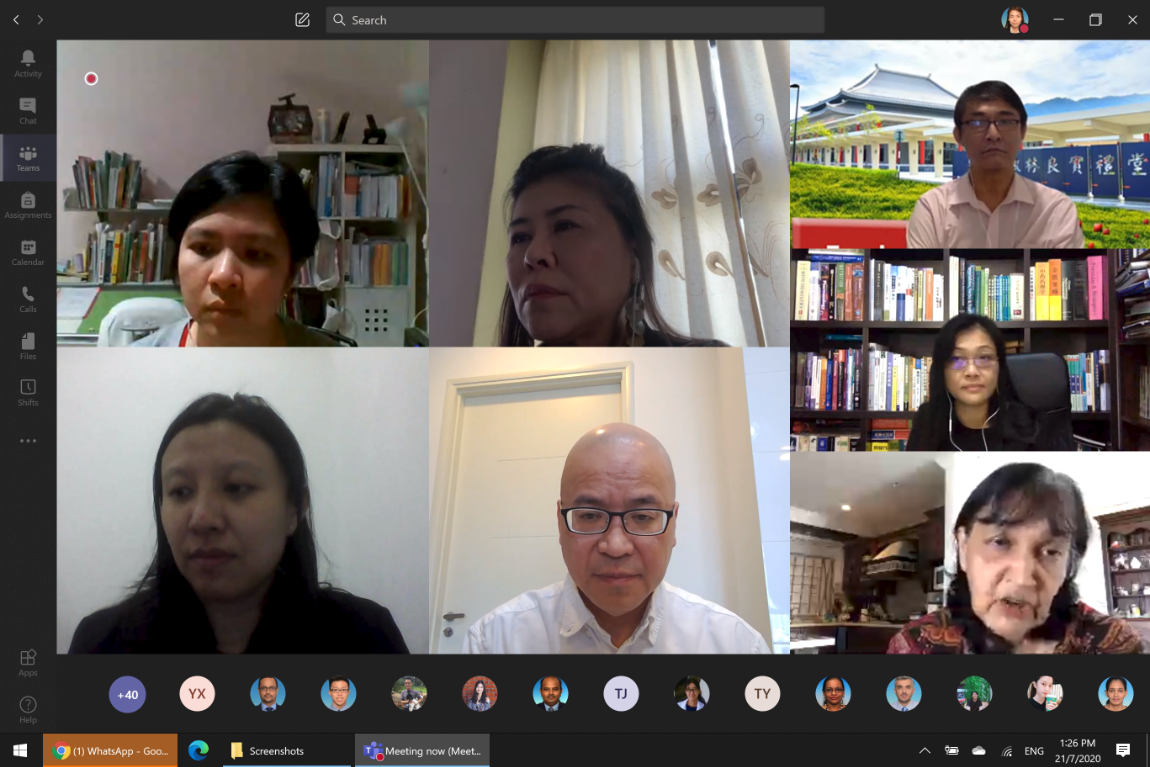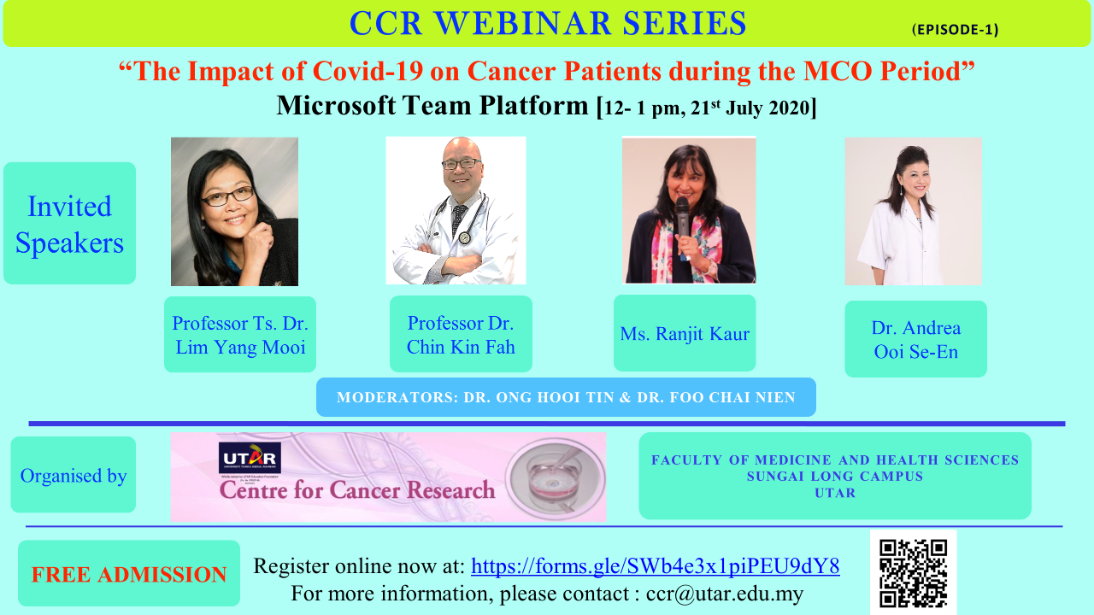Shedding light on the impact of Covid-19 on cancer patients
21 July 2020
The Centre for Cancer Research (CCR) and the Faculty of Medicine and Health Sciences (FMHS) organised its inaugural CCR Webinar Series on 21 July 2020 at Microsoft Teams. The webinar titled “The Impact of Covid-19 on Cancer Patients during the MCO Period” saw about 80 participations from UTAR staff, students and members of the public.
Sharing their knowledge and expertise in the webinar were FMHS Head of Programme for Postgraduate Programmes-cum-CCR Chairperson Prof Ts Dr Lim Yang Mooi, FMHS Prof Dr Chin Kin Fah, Breast Cancer Welfare Association Malaysia President Ranjit Kaur and Andrea Bariatric Surgery Bariatric and Metabolic Surgeon Dr Andrea Ooi Se-En while moderating the webinar were Dr Ong Hooi Tin and Dr Foo Chai Nien. Also present at the webinar was FMHS Department of Surgery Head-cum-Organising Chairperson Dr Yan Naing Soe and other UTAR staff.
Prof Lim welcomed the participants and said, “I would like to thank all the speakers for joining us today despite your busy schedule and sharing your knowledge with all the participants. Aside from the speakers, I appreciate the committee members for the great work and support that turned this event into a success. Last but not least, I wish everyone a fruitful meeting.”

In Prof Lim’s talk titled “The effect of Covid-19 on R&D”, she said, “The major research areas that need immediate action are Vaccine Development, Medication or Therapy, Health Care and Equipment, Economic and Sustainability, New Work Culture, Information Technology and Artificial Intelligence, Psychiatric and Psychological Issues, Social and Culture, Biological Warfare, and Public Health and Policy.”
“Covid-19 has disrupted the global economy and challenged the current health care system, affecting the lives of individuals around the world while posing new challenges to the global research community. Thus, it is critical to have a new wave of research that is multi-disciplinary and trans-national research. Let us all gain experiences and be well-prepared for future outbreaks,” added Prof Lim.
Prof Chin who is also the pioneer of Silent Mentor Program in Malaysia presented his talk titled “The effect of Covid-19 on the care of cancer patients” where he spoke about the susceptibility of Covid-19, diagnosis of Covid-19 infection in patients with cancer, Covid-19 method of testing, protection of Covid negative patients in cancer wards, surgery for cancer patients and impact on cancer mortality.
He said, “There is an infection rate of 0.79 per cent among cancer patients which is more than double the estimated 0.37 per cent cumulative incidence in Wuhan and lung cancer patients formed the largest group. In Malaysia, Covid-19 is diagnosed by using PCR of a nasopharyngeal and oropharyngeal swab sample. A thorough contact and travel history remains very pertinent. Although not currently approved in Malaysia, other countries adopt antibody and serology testing as adjuncts to PCR testing, especially for cancer patients where their immunoglobulin response may be attenuated.” He also said that a source from the Italian National Institute of Health showed that out of 355 patients who died, 20 per cent were cancer patients.
“Covid-19 MCO: Psychosocial challenges among cancer patients” was presented by Ranjit where she spoke about how the Movement Control Order (MCO) affects the cancer patients in different areas like medical, financial and psychosocial. “There was anxiety for all but it was worse for cancer patients as their health is in jeopardy and they are facing with distress such as difficulties in getting the supply of medication and delays in diagnostic procedures and treatment.” “The interim solution was recused by social media platforms. Thus, we had to identify the best app that suits everyone where we can conduct group counselling session using platforms such as Microsoft Teams. This is a real learning curve for everyone whereby we need to look at hospitals that are Covid-19 free and available for cancer diagnosis and treatment. This will be where we rise to the occasion and adapt to the changes we face. We are also looking at a new way to connect and to include people that are not IT savvy,” said Ranjit.
Dr Andrea spoke on “Risk of cancer and metabolic syndrome due to the change of lifestyle during Covid-19 stay home period” where she explained the types of fats, the complications of obesity as well as cancer-associated obesity.
She said, “There are several types of fat such as subcutaneous fat, abdominal muscle layer and intra-abdominal fat. Visceral fats are body fat that is stored within the abdominal cavity which are around a number of important internal organs such as the liver, pancreas and intestines. It is also known as the active fat because it plats a distinctive and potentially dangerous role, affecting how our hormones function.”
A Q&A session followed after the talk where each speaker took turns to answer some questions from the participants.
“It is a wonderful webinar. This webinar could not happen without the effort from everyone. We will continue to organise more webinar series in the near future. On behalf of CCR, I would like to extend my deepest appreciation to all the participants for joining this webinar. Stay safe and be happy,” said Dr Yan as he concluded the webinar.
The committee members of the webinar are FMHS Prof Lim, Dr Yan, Dr Ong, Dr Foo, Dr Ng Foong Leng, P. Thulasy, Norazlina binti Osman, Assoc Prof Dr Thaw Zin, Dr The Siew Hoon, Dr Fann Rui Jeat, Dr Shwe Sin, Dr Tint Soe Lwin, Dr Mohammed Abdulrazzaq Jabbar, Lim Shih Liang and S. Sheela.

